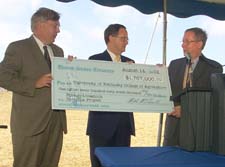UK Announces New Forage-Animal Program to Solve Farm Problems and Enhance Profitability
UK Announces New Forage-Animal Program to Solve Farm Problems and Enhance Profitability

Through a unique collaboration with the USDA's Agricultural Research Service (ARS), the University of Kentucky is launching an innovative new forage-animal research initiative. The program will discover new technologies to enhance the health and performance of grazing animals, with the result being more dollars for Kentucky farmers.
The program has already brought quick results in finding the likely cause of Mare Reproductive Loss Syndrome (MRLS), and its focus on grazing animals and forages means a wide range of benefits to agriculture.
"With seven million acres of forage crops, this state's agricultural economy has incredible potential for growth, and this new program is going to have a substantial impact on that," said U.S. Senator Mitch McConnell, who was instrumental in securing $1.4 million in funding for the current USDA budget for this initiative.
"A huge part of UK's mission is to conduct research that makes a real difference in people's lives, and this new forage-animal initiative is going to have a direct impact on not only farmers but the entire state economy," said Lee T. Todd, Jr., UK president. "Thanks to Sen. McConnell over $11 million has been directed to the University for agriculture in the last three years."
The new USDA-ARS Forage-Animal Production Unit will link scientists from both UK and ARS.
"The cooperative arrangement between ARS and UK is one of the real strengths of this new unit, which will be the only one addressing forage and animal relationships in the mid-south area," said Nancy Cox, associate dean for research in the UK College of Agriculture.
Pastured and grazing animal operations account for between $1.5 and 2 billion in Kentucky farm income - nearly half of all farm income for the state. With $1.4 million in federal funds already supporting research for this fiscal year, and a significant increase scheduled for 2003, the new USDA-ARS program promises continued efforts to enhance sustainability and efficiency of forage-based livestock systems.
Research approaches will range from cutting-edge genetics, to environmental impacts, to applied research.
"These research efforts will serve a variety of forage-livestock enterprises, including Kentucky's two largest animal enterprises, horses and cattle," said Scott Smith, dean of UK's College of Agriculture. "In fact, part of the funding for this fiscal year has already shown results in terms of helping our horse industry determine the causal factors related to Mare Reproductive Loss Syndrome."
MRLS, which hit several breeds and affected both large and small farms, caused more than $300 million dollars in losses to Kentucky's horse industry - the state's leading source of agricultural cash receipts.
In addition to the study indicating the role of the eastern tent caterpillar in MRLS, five other studies were conducted through ARS funding. They investigated a range of research from insecticide efficacy to mycotoxins on pastures.
"The finding on the significant role of the tent caterpillar means we can now move toward simple and effective control recommendations to reduce caterpillar populations on horse farms," said Smith, who noted that the equine industry has a $5 billion impact on Kentucky's economy.
In addition to horse and beef cattle research, the new unit also will focus on enhancing operations in dairy cattle, sheep, goats, cash hay production and a variety of other forage-based enterprises.
"Forage-based livestock systems are critical to Kentucky's farm economy," said Michael Barrett, chair of UK's agronomy department. "With this new Forage-Animal Production Unit we expect to strengthen our research efforts into matching forage quality to nutritional needs of livestock."
The new unit will be comprised of four ARS scientists housed in a wing of one of the College of Agriculture buildings. They will work on a range of collaborative projects involving UK scientists. USDA and College of Agriculture officials are planning for substantial future expansion of the program.
